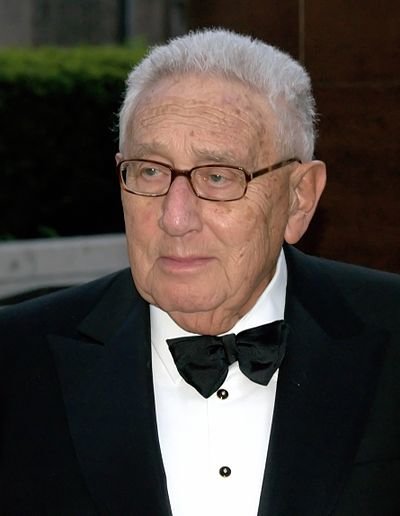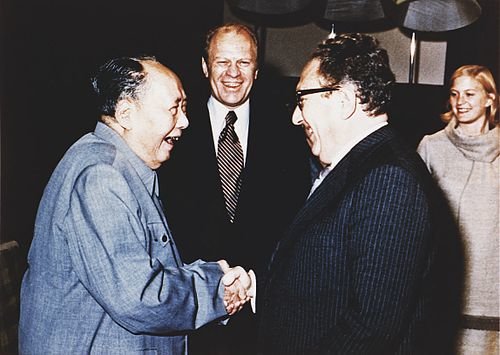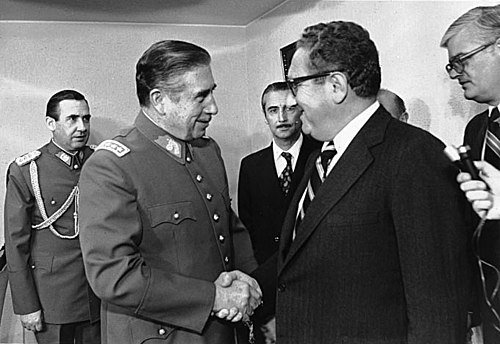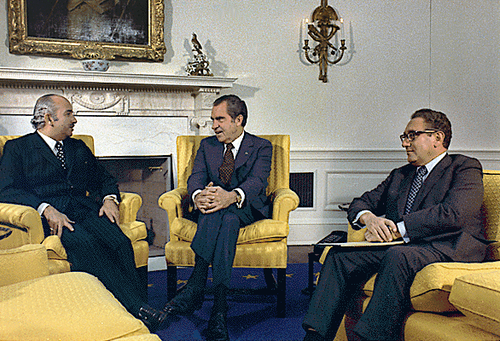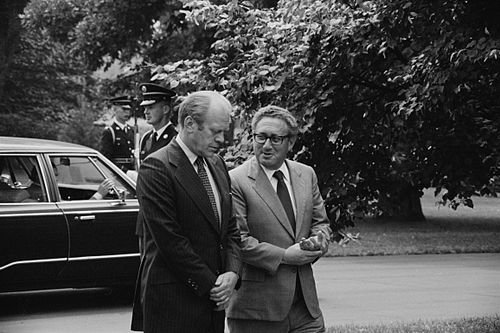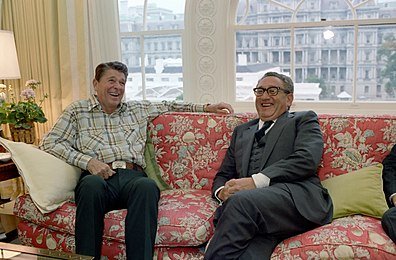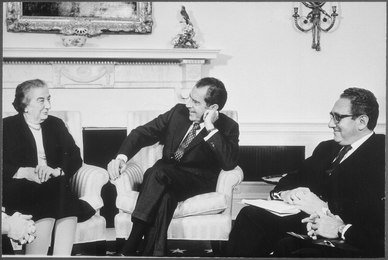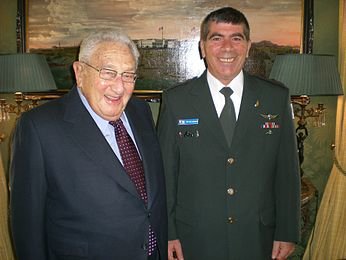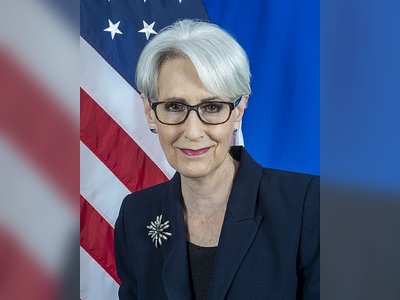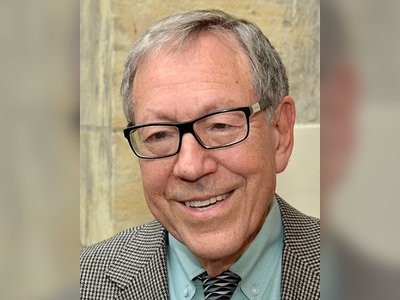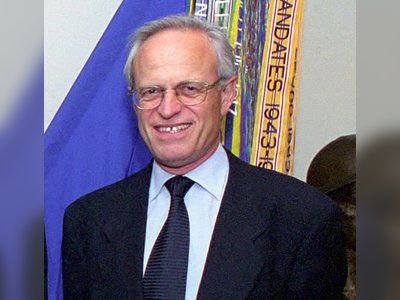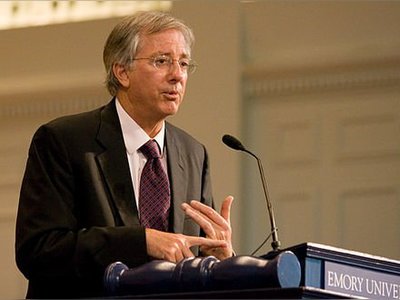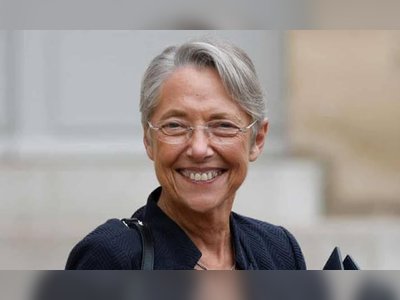Henry Alfred Kissinger
Henry Alfred Kissinger, born on May 27, 1923, is a Jewish-American diplomat who served as the National Security Advisor and later as the Secretary of State of the United States on behalf of the Republican Party. He was the first Jewish-American to hold these positions, and the first to serve in both roles simultaneously.
For his involvement in the negotiations leading to the Vietnam War ceasefire agreement, Kissinger was awarded the Nobel Peace Prize in 1973. The year before that, he was named Time magazine's Man of the Year.
During his tenure as National Security Advisor and Secretary of State under Presidents Richard Nixon and Gerald Ford from 1969 to 1977, Kissinger shaped U.S. foreign policy according to a realpolitik perspective. Between 1969 and 1977, he played a significant role in the détente process, which aimed to ease tensions between the Western and Eastern Blocs.
As part of this process, he was instrumental in establishing diplomatic relations with Communist China and signing the Paris Agreement in 1973, with the goal of ending the Vietnam War. Kissinger's realist approach led to controversial American actions, such as supporting Pakistan during the Bangladesh Liberation War, despite Pakistan's involvement in the mass killing of Bengali civilians, without any U.S. intervention.
Despite his significant influence in the political arena, Kissinger remains a controversial figure to some extent. While many researchers and academics consider him one of the most effective Secretaries of State in the latter half of the 20th century, human rights activists and activists see him as responsible for war crimes.
In addition to his political work, Kissinger has authored numerous books on foreign policy and diplomacy. He is the founder and president of the consulting firm Kissinger Associates, established in 1982, which provides diplomatic and political consulting services to heads of state and multinational corporations.
Early Life
Henry Alfred Kissinger was born as Heinz Alfred Kissinger in Bavaria, Germany, to a traditional Jewish family, during the Weimar Republic era. His father, Ludwig (Louis) Kissinger, was a teacher, while his mother, Paula (née Stern), was a homemaker. He had a younger brother named Walter. One of Kissinger's primary childhood interests was soccer, and he played for a time on the youth team of Groß-Bieberau, one of the prominent clubs in the region. During his youth in Germany, he was an active member of the Zionist youth movement.
Due to the rise of Nazi persecution, his family fled to London in August 1938 and later arrived in New York on September 5, 1938. After arriving in the United States, Heinz Kissinger changed his name to "Henry Kissinger." Despite adapting to life in the United States and excelling in his studies while rapidly learning English, he could never completely rid himself of his German accent, which was attributed to his shyness during his youth and hindered his accent removal.
After completing his high school education at the Washington Heights neighborhood in Manhattan, Kissinger integrated into the Jewish-German immigrant community, many of whom resided in the same neighborhood. Despite adapting to life in the United States, Kissinger, at times, struggled with the lingering traces of his German accent.
Following his first year of high school at George Washington High School, due to his family's economic struggles, Kissinger took evening classes while working during the day in a factory that produced shaving brushes. Upon completing his high school studies in 1940, Kissinger enrolled in accounting courses at City College of New York but was drafted into the U.S. Army in 1943.
Military Service
Upon his induction into the U.S. Army on June 19, 1943, Kissinger received American citizenship. He initially underwent engineering training at Lafayette College in Pennsylvania. However, the program was canceled, and he was reassigned to the 84th Infantry Division. Because of his proficiency in German, Kissinger was assigned to the division's intelligence unit. In this capacity, he participated in various operations involving the division, including the Battle of the Bulge.
As the U.S. military advanced in Germany, Kissinger, still only a corporal, was appointed the governor of the German town of Krefeld, a medium-sized city near Düsseldorf. Following the success of this appointment, he was promoted to sergeant and assigned to the Counter Intelligence Corps (CIC) to assist in capturing Nazi war criminals who had escaped U.S. forces. His performance in this role earned him the Bronze Star, his fourth significant decoration in the U.S. Army.
During his military service, Kissinger decided to abandon his accounting studies, which he had begun, and turn to academia with a focus on political history.
Academic Pursuits
In 1950, Kissinger completed his undergraduate studies in political science at Harvard University. In 1952, he completed his master's degree, and in 1954, he submitted his doctoral dissertation, which focused on the political philosophy of Lord Castlereagh and Metternich. His dissertation explored the need for statesmen to establish a political order based on a balance of power as the foundation for stability in the world. After receiving his Ph.D., Kissinger was appointed to the faculty at Harvard University. In 1957, he gained academic recognition when his book "Nuclear Weapons and Foreign Policy" assessed President Dwight D. Eisenhower's policy regarding the impact of nuclear threats on the balance of power with the Soviet Union.
Despite his burgeoning academic career, Kissinger began to take on various roles within the U.S. government. Between 1961 and 1968, alongside his work at Harvard, he served as a special advisor to Presidents John F. Kennedy and Lyndon B. Johnson on foreign policy matters.
In 1969, Kissinger left his position at the university after being appointed by President Richard Nixon to the role of National Security Advisor. He assumed this role on January 20, 1969.
As National Security Advisor, Kissinger, under President Nixon and as part of his realpolitik foreign policy, worked to facilitate the process of détente and ease relations with Eastern Bloc countries. As part of this effort, he played a significant role in the Strategic Arms Limitation Talks (SALT) between the United States and the Soviet Union, resulting in two agreements (the first in 1972 and the second in 1979). Another significant agreement, known as the Anti-Ballistic Missile Treaty (ABMT), aimed at limiting the use of anti-ballistic missile systems, was signed in 1972 following negotiations between the United States and the Soviet Union.
As part of the détente process, Kissinger was involved in negotiations that led to the signing of the Helsinki Accords in late July and early August 1975.
In an effort to exert diplomatic pressure on the Soviet Union, Kissinger also worked to improve relations with Communist China. In July 1971, Kissinger secretly traveled to China and met with Premier Zhou Enlai, who also served as Foreign Minister. Three months later, he made a second visit to the country. These diplomatic efforts bore fruit and led to a historic summit in 1972, in which President Nixon, Premier Zhou Enlai, and Chinese leader Mao Zedong participated. This summit marked the end of 23 years of no diplomatic relations between the two countries.
During the approach towards China, Kissinger leveraged his understanding that there were differences between Chinese Maoism and Soviet Leninism, which led to the possibility of using China as a counterbalance to the Soviet Union. This strategy became known as the "triangular diplomacy."
However, Kissinger's time as National Security Advisor and later as Secretary of State was not without controversy. His support for the controversial Operation Menu during the Vietnam War, which involved secret bombing campaigns in Cambodia and Laos, was one such contentious issue. Additionally, his support for Pakistan during the Bangladesh Liberation War in 1971, despite evidence of human rights abuses by Pakistani forces in East Pakistan (now Bangladesh), drew significant criticism from human rights advocates and members of Congress.
Kissinger's role in the Vietnam War ceasefire negotiations, which resulted in the Paris Peace Accords of 1973, earned him the Nobel Peace Prize jointly with North Vietnamese negotiator Le Duc Tho. The ceasefire, however, did not prevent the eventual fall of South Vietnam to Communist forces in 1975.
Kissinger also played a role in shaping U.S. policy during the Yom Kippur War in 1973, in which he worked to secure a ceasefire and contributed to negotiations that led to the disengagement of Israeli and Egyptian forces along the Suez Canal.
Secretary of State
On September 22, 1973, President Richard Nixon appointed Kissinger as Secretary of State, a role he held until January 20, 1977, under both Presidents Nixon and Gerald Ford. As Secretary of State, Kissinger continued his efforts to promote détente with the Soviet Union and negotiated various arms control agreements. Notably, he played a key role in the second round of SALT talks (SALT II), although this treaty was not ratified by the U.S. Senate.
Kissinger's tenure as Secretary of State also saw the evacuation of U.S. personnel and embassy staff from Saigon during the final days of the Vietnam War, as North Vietnamese forces captured the city. This marked the end of American involvement in Vietnam.
Another major development during Kissinger's time as Secretary of State was the 1973 Arab-Israeli War, also known as the Yom Kippur War. He played a central role in diplomatic efforts to end the conflict, including the negotiation of disengagement agreements between Israel and its Arab neighbors, Egypt and Syria. These agreements helped stabilize the situation in the Middle East and reduce the risk of further conflict.
After leaving his position as Secretary of State, Kissinger continued to be active in international affairs. He established the consulting firm Kissinger Associates, which provided advice on international relations to various clients, including governments and corporations. He also remained a prolific author, writing books on foreign policy and international relations.
Kissinger's Impact and Legacy
Henry Kissinger's approach to foreign policy, often characterized as realpolitik, focused on achieving practical and strategic objectives rather than strictly adhering to moral or ideological principles. His willingness to engage with both Cold War superpowers, the United States and the Soviet Union, as well as with China, helped reshape global geopolitics during a period of significant tension and rivalry.
While he received praise for his role in opening diplomatic relations between the United States and China and for his contributions to arms control negotiations, Kissinger also faced criticism for his involvement in controversial policies and actions, such as the secret bombing campaigns in Cambodia and Laos and his support for Pakistan during the Bangladesh Liberation War. These actions have led some to accuse him of being complicit in human rights abuses and war crimes.
In addition to his diplomatic career, Kissinger's books and writings have had a lasting impact on the field of international relations and have contributed to ongoing debates about American foreign policy. His emphasis on the balance of power, diplomacy, and the management of great power relationships remains influential in the study of international politics.
As of my last knowledge update in September 2021, Henry Kissinger was alive and active in his consulting work and writing. However, please note that this information may have changed since then, so I recommend verifying his current status and activities from reliable sources.
- הנרי קיסינג'רhe.wikipedia.org
